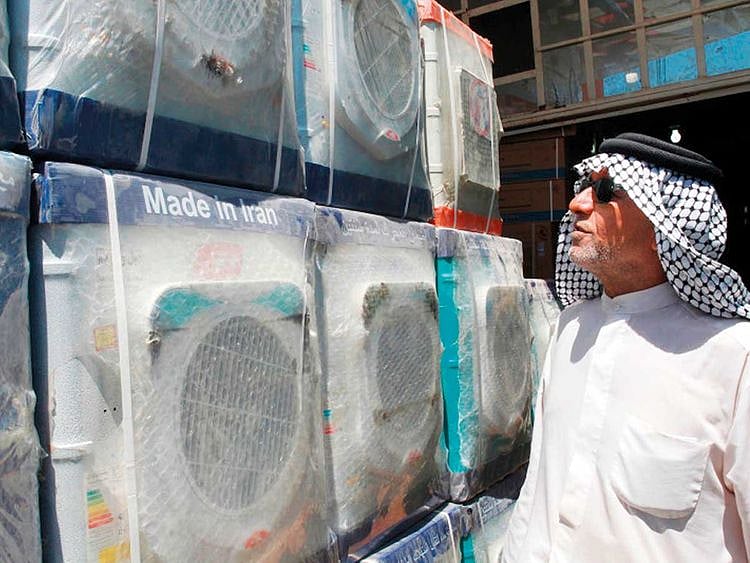Damascus: In May, thousands of Iraqis took to the streets of Baghdad, chanting: “No to war! Yes to Iraq.”
They were referring the possibility of military confrontation between Iran and the United States, after four oil vessels were attacked in Al Fujairah last May.
The US has responded with sending B-52 bombers to the region, along with an aircraft carrier, an assault ship, and Patriot missile batteries, raising tension to unprecedented levels in the Arabian Gulf.
“If the conflict escalates, Iraq will become a theatre for confrontation, rather than competition between Iran and the US,” warned Ayad Anber, a professor of political science at Kufa University.
At a grassroots level, however, few Iraqis see wisdom in sticking their necks out for either Iran or the United States, due to years of mismanagement and corruption, carried out by proxies of the two countries in Iraq.
“Iran still controls many decision-making circles in Iraq,” Anber told Gulf News, “and it’s very difficult for them to disengage economically from Tehran, given that Iraq remains a main market for Iraqi goods.”
Last May, President Hassan Rouhani visited Baghdad, proposing to boost bilateral trade from its current $12 billion USD to $20 billion.
Mailbox groups
The real problem, he notes, lies in Iraqi politicians who walk the fine line between simultaneously accommodating US and Iranian interest and “who insist on playing the role of a mailbox” for the two countries, “rather than convincing them of treating Iraq as neutral territory.”
On August 19, Iraqi President Barham Salih summoned the US and Iranian ambassadors to Baghdad, passing messages between the two countries while calling on them to de-escalate.
Earlier in June, Iraq had proposed hosting a conference to bring the US and Iran together.
Iraqi Foreign Minister Mohammad Al Hakim was more nuanced, saying: “The region is not prepared for war. Iraq should play a positive role in resolving the crisis with other Arab countries.”
Not everybody in the neighbourhood seems to agree to such a wise policy, however, even within Iraq itself.
At least one Iran-affiliated militia, Haraket Hezbollah Al Nujabaa, has ordered its fighters to strike at US interest in Iraq.
The Shiite militia is part of the Popular Mobilisation Units, a coalition of thirty military groups, all funded and armed by Iran, ostensibly set up to fight Daesh.
Last June, the Balad Air Base was attacked, north of Baghdad, housing US advisers who work in Mosul, and so was a housing complex near Basra where several US companies, including ExxonMobil, are based. Both attacks had fingerprints of Iranian proxy militias working in Iraq under the umbrella of the Baghdad government.
Iranian leverage
“Pro-Iran elements are very vocal, but otherwise, the public trend in Iraq is leaning toward independence from the Iran-US kerfuffle,” says Bilal Wahab, a Wagner Fellow at The Washington Institute.”
Upholding Iraqi nationalism won’t be easy, given that both the United States and Iran have invested so much money and time in post-Saddam Iraq and are expecting a tougher stance from Iraqi officialdom today.
Iraq still relies heavily on Iranian electricity, for example, and Tehran still supplies Baghdad with 4,000 megawatts of supply.
The Iranian government is also still heavily involved in the military training of Iraqi troops and providing them with sophisticated air defense systems.
Thanks to economic and military leverage, the Iranians still have great ability to destabilise and stir havoc in Iraq, should the country’s top leadership refuse to abide by its dictates.
Iraqis remember only too well how Iran withdrew support from ex-Prime Minister Haidar Abadi last summer, when he said that he was ready to abide by US sanctions on the Iranian banking sector.
Three months later, they oversaw Al Abadi’s fall from grace.
Limits to US influence
Despite illusions of power, the Americans have far less leverage in Iraqi domestics, adds Bilal Wahab, made all the more difficult by the fact that all US Embassy staff are currently on “ordered departure while the US consulate in Basra remains closed.”
Ordinary Iraqis remain furious with US President Donald Trump, who visited their country last February, without paying a courtesy visit to their elected leaders in Baghdad.
Instead, he only spoke to the 5,200 troops stationed there, saying that they were in Iraq to “monitor” Iran.
This put Iraqi statesmen in difficult waters, having constantly said that American forces had returned to Iraq only to help with the fight against Daesh.
The diplomatic insult was reciprocated by both President Barham Salih and Prime Minister Adel Abdul Mehdi, who have made no visit to the White House since their election last October.
“The ideal scenario, from Iraq’s perspective, is to have the US and Iran reconcile their differences and spare Iraq the hardship of choosing sides,” said Abbas Kadhim, director of the Iraq Initiative at The Atlantic Council.
“But, as this is unlikely now, Iraq has made it clear that both Iran and the US are indispensable allies and they both must understand that Iraq is not going to choose one of them over the other.”
Iraq’s most likely response to requests for a polarised stance from either country, he added to Gulf News, would be a “gentle, but unequivocal rejection.”
US less demanding on Iraq
All analysts seem to agree that the US has not demanded such a position from Iraq—to date, understanding how difficult and embarrassing it would be for the rulers of Baghdad.
“Unlike Iran, the US has wisely avoided asking Iraq to choose between it and Iran,” said Wahab, while, while Ayad Anber noted: “The United States has not applied pressure on Iraq to finalise its position on the conflict with Iran.”
Wahab wrapped up saying: “The US is not competing with Iran for leverage in Iraq; rather, it seeks to support an Iraq that is independent of Iran’s meddling.”
Sign up for the Daily Briefing
Get the latest news and updates straight to your inbox
Network Links
GN StoreDownload our app
© Al Nisr Publishing LLC 2026. All rights reserved.
